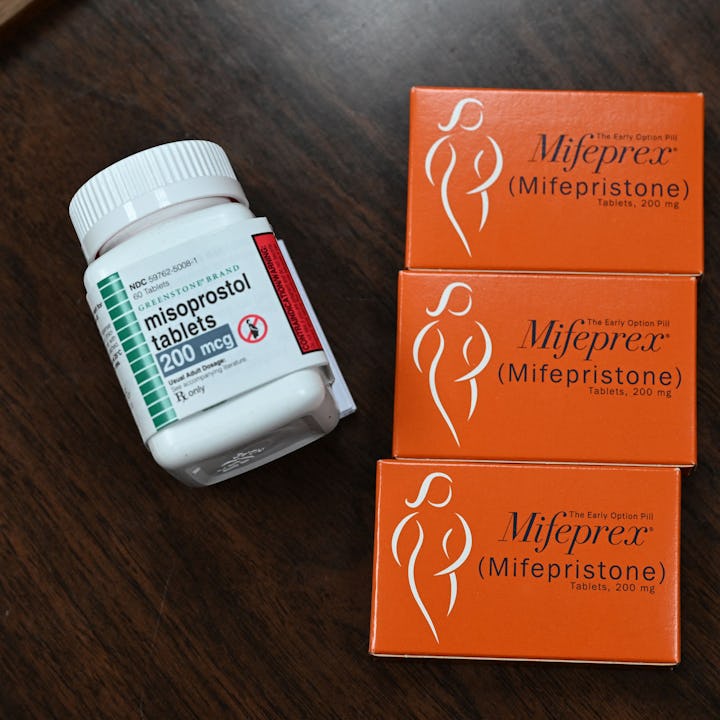States Cannot Ban FDA-Approved Abortion Pills
Attorney General Merrick Garland urged the FDA to sue any states trying to ban mifepristone after the Supreme Court overturned ‘Roe v. Wade.’

In the wake of the Supreme Court’s decision to overturn Roe v. Wade, we were all left with exponential concerns and questions — namely, of course, how in the world we got here. But fears about how our bodily agency would be affected on a day-to-day level shifted to the forefront. Could IUDs now be criminalized? What about Plan B, or even D&C procedures? And with abortions now banned in at least 14 states and roughly half of the U.S. states expected to enact bans on abortion or limits on abortion access, what about the “abortion pill”?
Shortly after Roe v. Wade’s overturning, Attorney General Merrick Garland issued a statement declaring that states cannot ban mifepristone, an FDA-approved medication used to induce an abortion during the first 10 weeks of pregnancy. He also said that states cannot restrict a person’s ability to travel across state lines to obtain an abortion.
“Today’s decision does not eliminate the ability of states to keep abortion legal within their borders...[The Department of Justice stands] ready to work with other arms of the federal government that seek to use their lawful authorities to protect and preserve access to reproductive care. In particular, the FDA has approved the use of the medication Mifepristone. States may not ban Mifepristone based on disagreement with the FDA’s expert judgment about its safety and efficacy,” Garland said.
Basically, since this abortion medication is approved by a federal agency, a state’s law cannot ban it, thanks to the Constitution's Supremacy Clause.
“This decision deals a devastating blow to reproductive freedom in the United States. It will have an immediate and irreversible impact on the lives of people across the country. The Justice Department will use every tool at our disposal to protect reproductive freedom,” Garland said. “And we will not waver from this Department’s founding responsibility to protect the civil rights of all Americans.”
What is the abortion pill?
The “abortion pill” — also known as “abortion with pills” or “medication abortion” — is an option for ending an early pregnancy through the use of two kinds of pills: mifepristone and misoprostol (or just misoprostol, if the former isn’t available). The combination of mifepristone and misoprostol is considered the most effective method of abortion with pills and is approved by the U.S. Food and Drug Administration (FDA). The use of misoprostol alone is less effective and endorsed by the World Health Organization in areas where mifepristone is unavailable.
What are the side effects of the abortion pill?
Abortion pills, by design, cause bleeding and cramping as part of the abortion process. Although many people don’t have symptoms after taking mifepristone (the first pill) but begin experiencing them after taking misoprostol (the second pill). The level of bleeding and severity of cramping will naturally vary from person to person.
Other side effects you may experience include feeling sick to your stomach, throwing up, diarrhea, headache, dizziness, and fevers. If you start to run a fever that exceeds 100 degrees or have excessive bleeding, you should seek medical attention.
Is the abortion pill legal?
Reproductive justice advocates and organizers know that, even with Attorney General Merrick Garland’s remarks, the abortion pill will continue to be a topic of contention. Currently, 19 states have laws that ban doctors from prescribing the abortion pill through telemedicine, even though the FDA permanently removed the in-person requirement back in December.
The legality of the abortion pill has already entered the courts in some states. GenBioPro Inc., a manufacturer of the medication, is challenging Mississippi’s legislation that requires patients to see a doctor in person, rather than telemedicine, in order to obtain the medication.
As more states’ trigger laws go into effect and conservative states follow the lead of states like Texas and Oklahoma that have all-but-outlawed abortions, the fight for the legality of the abortion pill will continue.
This article was originally published on